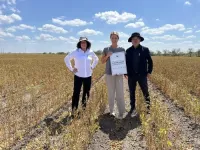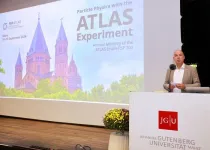(Press-News.org) UT Arlington biologists, working with underserved farmers in South Texas, have harvested their first crop of climate-smart soybeans. This harvest is part of a four-and-a-half-year, $5 million project funded by the U.S. Department of Agriculture (USDA) to test whether climate-smart agricultural practices can reduce emissions of greenhouse gases (GHGs) responsible for climate change—including carbon dioxide, methane, and nitrous oxide—while simultaneously increasing crop production.
“We are the first to harvest climate-smart soybeans in this program, in part because of the earlier growing season in South Texas,” said Woo-Suk Chang, professor of biology at UTA and principal investigator on the USDA grant. “Most people don’t realize it, but farming activities make up about 10% of GHG emissions. We’re hoping to help the agriculture industry change that.”
As part of the project, researchers from UTA, Texas A&M AgriLife, Tarleton State University, and the University of Missouri collaborated with 14 farmers across Texas, Arkansas, and Missouri to implement five climate-smart agricultural practices, including:
No-till agriculture: Conventional tillage, which typically involves intensive soil disturbance, can result in nutrient loss and the release of carbon from the ground. To positively impact soil health, the researchers are encouraging farmers to adopt no-till planting strategies to preserve carbon storage.
Cover crops: Growing different vegetation during the winter, known as cover crops, can help improve the nutrients in the soil. Soil scientists are experimenting with various cover-crop mixtures to see which ones are most effective at improving soil health.
Crop rotation: Alternating the crops grown each season can help keep nutrients in the soil and prevent erosion. Researchers are testing the best crop rotation strategies for climate-tolerant soybeans (i.e., drought-tolerant and flood-tolerant cultivars) that have been developed to handle extreme weather events.
Bio-inoculants: Microorganisms such as bacteria and fungi can be introduced to the soil to help naturally fertilize it while increasing plant resistance to insects, disease, and extreme weather. Researchers in the trial are testing whether a drought-tolerant nitrogen-fixing inoculant developed by the Chang Lab can increase crop yields while reducing GHG emissions.
Biochar: Biochar is a type of black carbon produced by the partial burning of organic waste like wood chips and manure. Scientists are studying how adding biochar to the soil can help retain water and trap GHGs in the soil, preventing their release into the atmosphere. The first climate-smart soybeans were harvested from the fields where biochar had been applied. “Biochar would play a leading role in enhancing agricultural and environmental sustainability with climate change mitigation in soybean fields,” said Eunsung Kan, professor of biological and agricultural engineering at Texas A&M AgriLife.
As the rest of the farmers in the project harvest their crops this fall, the UTA climate-smart team will evaluate the reduction of GHG emissions and potential yield increases due to these agricultural practices. Additionally, they will use a portable gas analyzer to measure and monitor if the test farms were successful in reducing the levels of carbon dioxide, methane, and nitrous oxide.
Another goal of the USDA Partnership for Climate-Smart Commodities program is to develop a market for these products. If this and other pilot projects growing climate-smart commodities prove successful, the next step will involve creating a market through outreach and advertising for climate-smart agricultural products. The UTA team has been collaborating with Texas Valley Grain to establish a climate-smart market in South Texas, with the potential to export these products to Mexico.
“Just as consumers are willing to pay extra for organically grown products, we hope to create a marketplace where they will have a choice to support underserved farmers whose practices help reduce GHG emissions,” said Andrew Scott, an agricultural consultant and soybean expert in South Texas. “We’re already seeing this trend in the energy market where consumers have a choice to select plans where much of the electricity comes from wind or solar. Our goal is to offer a similar choice when it comes to purchasing commodities.”
END
UTA harvests first climate-smart soybean crop
USDA project aims to reduce greenhouse gas emissions
2024-09-12
ELSE PRESS RELEASES FROM THIS DATE:
JGU hosts annual meeting of the ATLAS Collaborative Research Center
2024-09-12
The connections between particles and their mass, the composition of the universe out of matter and antimatter and the search for previously unknown particles such as the so-called “dark matter” are the focus of researchers at the research center CERN in Geneva, which is celebrating its 70th birthday this year with events all around the world. In four large-scale experiments, scientists at the Large Hadron Collider (LHC) are getting to the bottom of the secrets of the universe. This particle accelerator offers researchers ...
Med school scientist receives prestigious NSF award for inflammation research
2024-09-12
Associate Professor Justine Tigno-Aranjuez will use a five-year grant of more than $1 million to study how influences on the production of lipid mediators to better understand impacts on inflammation.
A College of Medicine researcher has received a prestigious U.S. National Science Foundation CAREER Award to support her research into the cellular causes of inflammation, discoveries that could be pivotal for treating conditions like Crohn’s disease and arthritis.
Justine Tigno-Aranjuez’s lab has been researching lipid mediators — ...
Uptick in drug overdose rates is widely reported especially among young women
2024-09-12
Overdose rates in Colombia involving illegal opioids, hallucinogens, stimulants and sedative psychotropic medication increased greatly during 2018-2021, mainly caused by overdoses in young women, according to a study at Columbia University Mailman School of Public Health. Drug overdoses increased by 356 percent from 8.5 to 40.5 percent per 100,000 individuals from 2010 to 2021. The findings are published in the American Journal of Public Health.
The study is the first to describe national ...
Understanding what helps families with teens maintain household vaping bans
2024-09-12
UNIVERSITY PARK, Pa. — In the roughly 20 years since e-cigarettes were introduced in the United States, use among young people has grown substantially. By 2022, more than one in five high school seniors reported they had vaped nicotine in the past month.
Household smoking bans — rules against anybody smoking inside a home — are an effective tool for delaying or preventing teen cigarette smoking, according to Jennifer Maggs, professor of human development and family studies at Penn State, and her collaborators, so they examined if the same might hold true for vaping. They assessed how many households with teenage children in the ...
Can AI talk us out of conspiracy theories?
2024-09-12
Have you ever tried to convince a conspiracy theorist that the moon landing wasn’t staged? You likely didn’t succeed, but ChatGPT might have better luck, according to research by MIT Sloan School of Management professor David Rand and American University professor of psychology Thomas Costello, who conducted the research during his postdoctoral position at MIT Sloan.
In a new paper “Durably reducing conspiracy beliefs through dialogues with AI” published in Science, the researchers show that large language models can effectively reduce ...
‘Even the deepest of rabbit holes may have an exit’
2024-09-12
Embargoed: Not for Release Until 2:00 pm U.S. Eastern Time Thursday, 12 September 2024
‘Even the deepest of rabbit holes may have an exit’
Pathbreaking psychology study reveals conversations with AI models can reduce conspiracy theory beliefs
(WASHINGTON, D.C.) Sept. 12, 2024 – ‘They’re so far down the rabbit hole of conspiracy theories that they’re lost for good’ is common thinking when it comes to conspiracy theorists. This generally accepted notion is now crumbling.
In a pathbreaking research study, a team of researchers from American University, ...
An exit for even the deepest rabbit holes: Personalized conversations with chatbot reduce belief in conspiracy theories
2024-09-12
Personalized conversations with a trained artificial intelligence (AI) chatbot can reduce belief in conspiracy theories – even in the most obdurate individuals – according to a new study. The findings, which challenge the idea that such beliefs are impervious to change, point to a new tool for combating misinformation. “It has become almost a truism that people ‘down the rabbit hole’ of conspiracy belief are almost impossible to reach,” write the authors. “In contrast to this pessimistic view, we [show] that a relatively brief conversation with a generative AI model can produce ...
How is open access transforming science communication?
2024-09-12
In a Policy Forum, Mark McCabe and Frank Mueller-Langer explore how new open access (OA) mandates and agreements are changing how scientists share their work. They outline key contemporary unknowns in the open access landscape, as well as avenues for continued research. Since 2003, many national governments and international organizations have supported the Berlin Declaration on Open Access (OA) to Knowledge. More recently, some governments and organizations have introduced mandates to ensure open access ...
US food waste bans fail to reduce landfill waste, except in Massachusetts
2024-09-12
State-level bans on commercial organic waste disposal have largely failed to reduce landfilled waste across the U.S., with one state standing out as the lone success, according to a new study. Massachusetts alone achieved a significant reduction in landfilled waste when it implemented food waste bans. The findings underscore the importance of well-designed and enforced policies, with Massachusetts offering a potential model for effective waste management. “Our study shows that food waste bans are far from guaranteed to be successful,” ...
Greenland landslide-induced tsunami produced global seismic signal that lasted 9 days
2024-09-12
In 2023, a massive rockslide in East Greenland, driven by glacial melt, triggered a towering tsunami and a rare global seismic signal that resonated for nine days, according to a new study. The study provides insights into how climate change-induced events like glacial thinning can lead to significant geophysical phenomena with impacts extending throughout the Earth system. Due to climate change, steep slopes are increasingly vulnerable to landslides. In Arctic regions – which are undergoing the most rapid warming globally ...
LAST 30 PRESS RELEASES:
First evidence of WHO ‘critical priority’ fungal pathogen becoming more deadly when co-infected with tuberculosis
World-first safety guide for public use of AI health chatbots
Women may face heart attack risk with a lower plaque level than men
Proximity to nuclear power plants associated with increased cancer mortality
Women’s risk of major cardiac events emerges at lower coronary plaque burden compared to men
Peatland lakes in the Congo Basin release carbon that is thousands of years old
Breadcrumbs lead to fossil free production of everyday goods
New computation method for climate extremes: Researchers at the University of Graz reveal tenfold increase of heat over Europe
Does mental health affect mortality risk in adults with cancer?
EANM launches new award to accelerate alpha radioligand therapy research
Globe-trotting ancient ‘sea-salamander’ fossils rediscovered from Australia’s dawn of the Age of Dinosaurs
Roadmap for Europe’s biodiversity monitoring system
Novel camel antimicrobial peptides show promise against drug-resistant bacteria
Scientists discover why we know when to stop scratching an itch
A hidden reason inner ear cells die – and what it means for preventing hearing loss
Researchers discover how tuberculosis bacteria use a “stealth” mechanism to evade the immune system
New microscopy technique lets scientists see cells in unprecedented detail and color
Sometimes less is more: Scientists rethink how to pack medicine into tiny delivery capsules
Scientists build low-cost microscope to study living cells in zero gravity
The Biophysical Journal names Denis V. Titov the 2025 Paper of the Year-Early Career Investigator awardee
Scientists show how your body senses cold—and why menthol feels cool
Scientists deliver new molecule for getting DNA into cells
Study reveals insights about brain regions linked to OCD, informing potential treatments
Does ocean saltiness influence El Niño?
2026 Young Investigators: ONR celebrates new talent tackling warfighter challenges
Genetics help explain who gets the ‘telltale tingle’ from music, art and literature
Many Americans misunderstand medical aid in dying laws
Researchers publish landmark infectious disease study in ‘Science’
New NSF award supports innovative role-playing game approach to strengthening research security in academia
Kumar named to ACMA Emerging Leaders Program for 2026
[Press-News.org] UTA harvests first climate-smart soybean cropUSDA project aims to reduce greenhouse gas emissions


